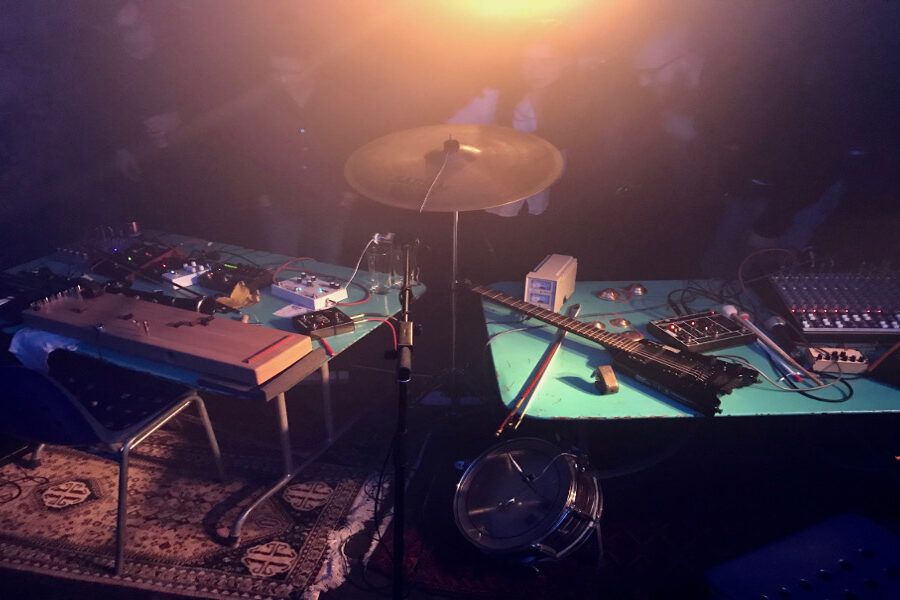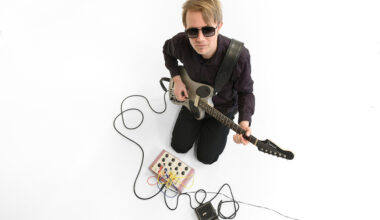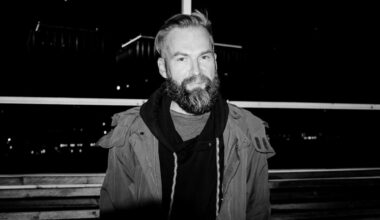For the occasion of the ROTOR concert series in 2015, the duo Sollmann & Gürtler staged a stunning aural conversation between a ring modulated electric guitar and a variety of reed instruments, sent through a cluster of electronic filters and devices underneath a freeway bridge in Offenbach, Germany.
Phillip Sollmann, also known as Efdemin, recently worked on his Monophonie project for Volksbühne Berlin, RuhrtrIIIennale and Kampnagel Hamburg including instruments originally designed by American composer and maverick Harry Partch. Next to this, he collaborated on a modular church organ system with Konrad Sprenger.
Multi instrumentalist John Gürtler is part of the collective Paradox Paradise. He is mainly a film musician and composer, who won multiple awards for his scores.
On a rainy Friday afternoon, D/B caught up with the duo at their crammed studio space in Wedding to talk music, inspiration and their concepts of space-time. With hot coffee passing, Sollmann took up one of the sculptures he plays as an instrument, to perform a little over our conversation. Sounds slipped through the words, while the two of them took their time to answer the questions in good humour. An interview in times where the place of each measure found a generous space.
QUESTIONS
1. What is the biggest inspiration for your music?
Gürtler: Inspiration is somewhere and everywhere. I cannot simply take a week off and just be inspired. This kind of ‘free‘ time doesn’t exist for me. Ideas don’t stop growing, whether we’re sleeping, moving or traveling. Something’s always happening in your head and that’s usually present a little bit when you start working on something.
Generally, our greatest inspiration is simply to listen to the way the world sounds. And to try to translate sounds into music, to organize it. When we listen to the sounds that surround us, we totally lose sense of time and space. Ideally, this would also happen to the audience listening to us play.
2. How and when did you get into making music?
Sollmann: I was surrounded by music at home. My older brother and my mother were playing the piano. My mother was obsessed with Bach. When she listened to music, which she did most of the time, she would hear Bach’s compositions at a very high volume. While working in the garden, she would open all the windows so that she could hear it outside. It was a kind of Open Air Concerto, in the middle of Brandenburg … I started playing Cello when I was 6 years old. And now I’m playing Sculptures, and I really like it.
We met [in Berlin] when we both moved here. That’s when we started to build the studio configuration. Then, quite naturally, talking about our own projects, instruments and ideas, we started working together.
Gürtler: I have a Portuguese mother who sang all day long. She was singing, even when she didn’t notice it. At age 11, I wanted to play Saxophone because some other guys who played Saxophone were loved by all the girls in my class. I stopped for a few years and then realized that I really liked this instrument. However, I did not follow classical training. I had a very old English teacher who taught me music by letters. So I used to have these little books with letters, and I was composing then, without any sense of time. And after starting to study jazz Saxophone in Berlin, I realized it was not for me, so I started doing other things. It took me a while to be able to compose music for films, but now I’m really happy with that. Composing music for a movie is good because for each film it’s a different approach and genre.
3.What are your favorite albums of all time?
Gürtler:
Oskar Sala – Subharmonische Mixturen
Chico Freeman -Spirit Sensitive
Sollmann:
Yoshi Wada – Singing in Unison
Evan Parker – Time Lapse
4. What do you associate with Berlin?
Sollmann : It’s just the best place to meet great people. Even though it took me a long time to realize it, I can now say that it’s home.
Gürtler: I love Wedding because it does not change as fast as other parts of the city. I feel very comfortable in Berlin, in a simple way. It’s the only town in Germany, that I can imagine living in.
5. What’s your favorite place in your town?
Sollmann & Gürtler
Our studio
6. If there was no music in the world, what would you do instead?
Sollmann: I would invent music
Gürtler: Probably kill myself
7. What was the last record/music you bought?
Gürtler:
Twin peaks OST season 3
John Lennon – Plastic Ono Band
Sollmann:
Catherine Christer Hennix – Electric Harpsichord
Mika Vainio – Reat
8. Who would you most like to collaborate with?
Gürtler :We have a good friend, Daniel Eichholz. He plays with the Berliner Philharmoniker, the live techno act Schulz und Söhne, as well as being part of the Zafran Ensemble.
He’s an incredible percussionist. We’ve been trying to get together for a while now. Maybe it will happen soon.
9. What was your best gig (as performer or spectator)?
Sollmann: Evan Parker playing solo at the Sophiensæle in Berlin some years ago. He blew his soprano Saxophone for a full hour – and actually changed my life. Some years ago I listened to Ensemble Musikfabrik playing Harry Partch’s « Delusion of the Fury » at the Ruhrtriennale. That was unbelievably good.
Gürtler: It was the a concert in Frankfurt of Ensemble Modern playing « Hanns Eisler: Eislermaterial » and in Lisbon, seeing Charles Lloyd, the Saxophone player.
10. How important is technology to your creative process?
Sollmann: Every day a little less, which I totally like. More and more, I feel like I’m ridding myself of electronic music and technology. Our music is a kind of “pre-internet” music. Here, it’s like a bubble. When you enter, you do not have all the stress you have in everyday life, with technology trying to penetrate you without your consent.
Gürtler: I am trying to get away from it. On the other hand, it is very convenient for everyday things. But when we make music, the computers are off.
11. Do you have siblings and how do they feel about your career/art?
Sollmann: My brother thinks that my music is super boring because he is totally into modulation and harmonic change, Renaissance music basically. He’s not really interested in what I do.
Gürtler : I also have a brother and he’s somewhere between no appreciation and not really interested in the subject. He has nothing against it, but I won’t run to him and tell him that I’m composing a new song.
A few words about “Gegen die Zeit”:
Sollmann: It’s about improvising. We improvise a lot in the studio. But when going out and performing onstage, there’s no safety net.
We both carry around our influences, but at the same time we try to get rid of all the techniques, the basic idioms we learned. For us now, it’s very much about “basic sounds”. More sound than music. And it’s very much about time, thinking about the idea of time. That’s what the title refers to. How do you construct time or a perception of time? Tuning is of course related to time. In a way, tuning is a function of time.


